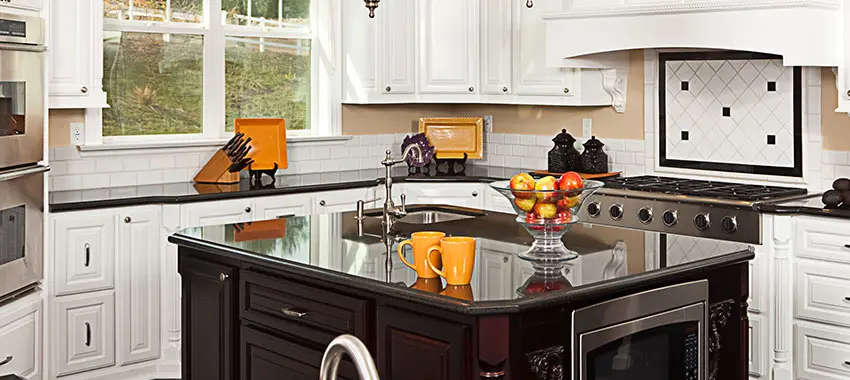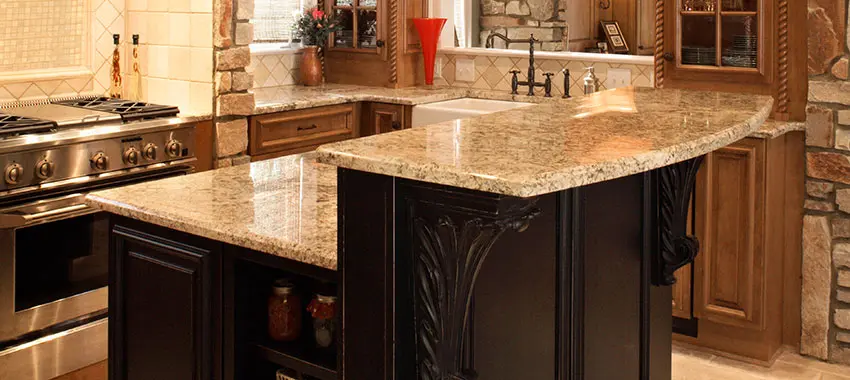Sep
What Is The Weakness Of Quartz Countertops?
- 2023
- FlintStoneTops
Quartz countertops are the strongest man-made countertops to exist. They are marketed to be flawless and there seems to be no weakness to them. However, if you look closely, then you can spot a few chinks in the armor. Here are some disadvantages of quartz you should be aware of before deciding on the kitchen countertop material and connecting with countertop replacement services.
It Is Expensive
The biggest issue with quartz countertops is that they are not affordable. People can’t seem to swell their budget for a countertop material when there are a lot of other options available that are good enough, if as not as good as quartz.
For context, one square foot slab of quartz can cost you anywhere between $80 to $160 depending on the quality and where you get it from. If you have a bigger kitchen to work with, then the installation is going to cost you a lot.
Even though a lot of people love quartz and are willing to pay the price for it, this can’t be said about the majority of people who just want a simple countertop material that will last for a decent amount of time.
Some people don’t want super durable countertops because they change the material regardless of how much time has passed. This is why it’s important to keep your preferences in mind, especially if you’re someone who can’t commit to one material and wants some variety.
Damage By Heat Is Normal
Another thing about quartz countertops is that they can get damaged by heat. This is a huge issue among a lot of people and this can create a distaste for quartz as well. The reason is that this weakness is quite misleading if you compare it with the qualities of how quartz is marketed. Quartz is known to be an indestructible man-made material, but something like heat can put a damper on the illusion of the seemingly perfect material.
As for heat damage, you can’t put hot pots and cooked food on top of the surface of the quartz, because the hot temperature will shock the material and it can lead to the formation of ugly black-colored stains. These stains not only look unpleasant to the eye, but they’re almost impossible to get rid of.
If you’re paying that much money for a countertop material, then you’d at least expect it to be heat-resistant. However, quartz is not able to resist a lot of heat and while physical looks are ruined, there can also be internal damage, in the form of hairline cracks under the surface that can make the countertops weak over time.
The reality is that most countertop materials are not heatproof. They are heat resistant to an extent. The same is true for quartz countertops. So, you will need to avoid heat damage to your countertop whichever material you choose.
You Can’t Install It Outdoors
A lot of people love the idea of an outdoor kitchen, and while there are a lot of perfect materials that can withstand the elements of the outdoors, the same can’t be said about quartz countertops.
These countertops are not made to be UV light resistant. These UV rays come with the sunlight and can penetrate different materials and cause damage. With other materials, they also damage quartz countertops.
You can visibly see a difference in how the quartz will look after it has been exposed to sunlight for a few hours or days. It will look faded. The shine will be gone and the whole countertop just won’t look appealing at all. This is because the UV rays can easily ruin the color of quartz which is why it looks faded and diffused.
Quartz, during manufacturing, is not treated to be UV resistant and those external clear sealants can’t do much either.
There are a lot of other materials like granite and concrete that are naturally resistant to the damage of UV rays. They’re considered to be a much better option for an outdoor kitchen as compared to quartz, which is why people go for those materials.
Limited Options For Sinks
When you’re getting new countertops installed, you also need to think about the cavities for the sink. This makes installation much easier and seams are a non-issue. But quartz countertops seem to be a hindrance in this aspect too. There aren’t a lot of options available in quartz countertops that can incorporate cavities for sinks.
They are usually installed in the form of short slabs and that makes the process a lot more time-consuming. It’s also a difficult thing to do at the end of the day. This is why quartz is not recommended if you’re trying to go for a seamless installation of countertops.
Can’t Be Installed By Yourself
You can install many different materials yourself if you have a bit of time and the right materials and tools on hand, but the same can’t be said about quartz. As mentioned previously, quartz is not a seamless installation and the slabs are usually installed in smaller increments, like a jigsaw puzzle, which is why seams can be a problem. You will need a professional to properly install the countertops without showing any seams, so you need to bite the bullet and hire the big guys because they will do a much better job of installation.
While professional installation is great and it doesn’t leave any room for errors, it’s also quite expensive. Not a lot of people want to spend that much money on it and they can get apprehensive about this fact.
This can lead to a huge dilemma about getting quartz for your kitchen countertops So, you need to think about your options.
Harmful To The Environment
Quartz is a man-made material, so it will impart some sort of damage to the atmosphere. This material is made in large factories with a lot of compounds mixed and all of these processes can produce vast quantities of industrial waste.
This can be a huge hazard for the environment and the people, which is why a lot of people don’t support many man-made materials, quartz included. They go for much more natural and sustainable options that are sourced without putting the health of the people and the environment in jeopardy. This fact can also shave some points off quartz countertops.
Seams Are An Issue
Seams are irritating for a lot of people, especially if the slabs are installed in smaller increments. This can make the seams visible, even if the installers were careful not to let anything show through. If you want a smooth and seamless installation and feel of quartz, then you’ll be disappointed to know that quartz will not live up to your expectations. There will always be some jagged corners or seams that will bother you and it will ruin the entire look of the countertops.
Why Choose Quartz Countertops?
As we’re done with the disadvantages of quartz, we will also state why quartz is a popular countertop material. The biggest benefit is that quartz countertops add value to your house. Granite is the only other material that adds a similar value as quartz.
Moreover, it’s easier maintain than all natural stones including granite because it doesn’t require sealing. Plus, quartz is slightly more durable than granite even though it’s suitable not for outdoors.
Conclusion
These are the disadvantages of quartz countertops and they can be a deal breaker for some people. So, if you’re considering buying quartz for your kitchen, then it’s good to know both sides of the picture and ask the quartz countertop dealer Rockville the right questions.



